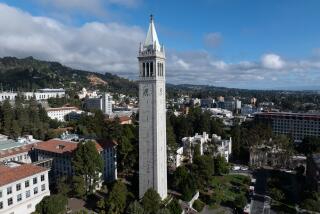Stanford Launching a Global Studies Initiative
- Share via
Backed by $94 million in donations and pledges, Stanford University is launching an innovative international studies effort intended to team up scholars from varying fields to research global issues such as bioterrorism and the spread of disease. The biggest part of the funding, $50 million, for the International Initiative is coming from Los Angeles investment bankers Bradford Freeman and Ronald Spogli, both Stanford graduates.
The money will finance research efforts and up to 10 interdisciplinary professor positions. It will also provide undergraduate scholarships for international students, expand the international policy studies master’s program and support Stanford’s Center for Global Business and the Economy, and the Asia-Pacific Research Center.
Stanford’s initiative, announced Thursday, is the latest in a series of efforts by the university and other leading schools to break down traditional academic barriers between experts from different disciplines. But most of the biggest interdisciplinary efforts have been related to the biological sciences or engineering rather than the social sciences.
“Increasingly, what we find is that most of the most complex and most intriguing questions that come our way require expertise from multiple disciplines. So we’re trying to build out that capacity,” said Coit D. “Chip” Blacker, director of the Stanford Institute for International Studies and the professor leading the new initiative.
The initiative’s three main research focuses will be security, governance and health issues.
Stanford officials said they could not indicate how much of the initial $94 million has already been given to the university.
Blacker is a foreign policy expert who served as special assistant to the president for national security affairs in the Clinton administration. He predicted that the International Initiative would draw $125 million in donations within a year and said he was hopeful that gifts would eventually total $250 million.
Under the new interdisciplinary initiative, Stanford expects to bring together political scientists, economists, public health experts and specialists from various other fields.
More to Read
Sign up for Essential California
The most important California stories and recommendations in your inbox every morning.
You may occasionally receive promotional content from the Los Angeles Times.













